Biden claims he was at Ground Zero the day after 9/11 – despite his own book saying he was in the nation’s capital
Joe Biden used the anniversary of September 11 to claim he remembered “standing there the next day and looking at the building” in New York – when in fact he was in Washington DC.
Biden, 80, was criticized for becoming the first president in the 22 years since the attacks not to spend the anniversary at one of the three sites of the September 11 plane crashes.
He compounded the criticism on Monday by falsely claiming he was in the Twin Towers the day after the attack – while writing in his own autobiography that he was in Washington DC.
Biden on Monday also embellished his memories of that day, claiming he saw a “fireball” at the Pentagon on September 11, describing it in his book as “a haze of brown smoke.”
Joe Biden is seen speaking to troops in Anchorage, Alaska, on Monday, the 22nd anniversary of September 11. He is the first president not to spend the anniversary at the site of one of the three plane crashes
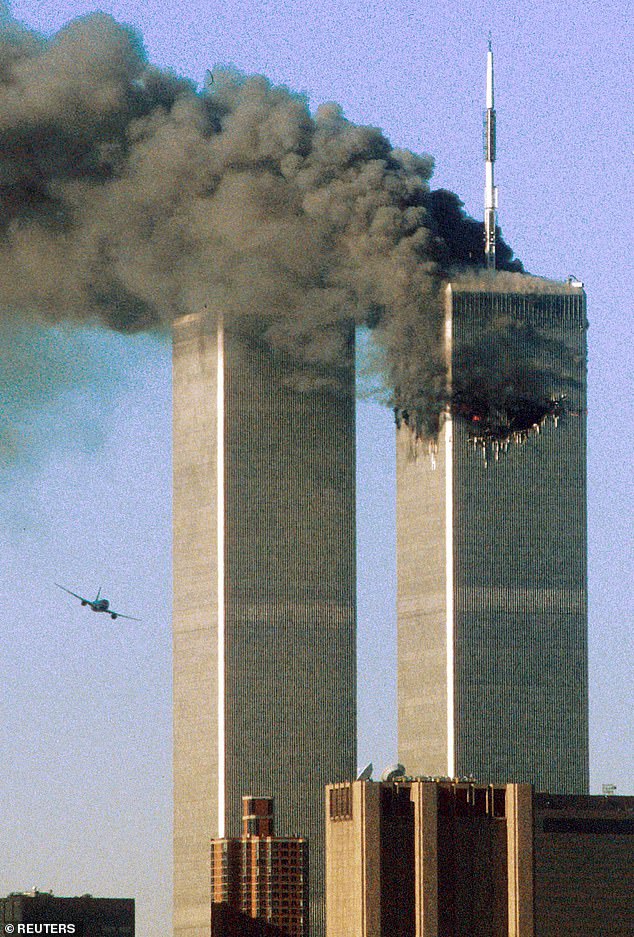
The photo shows planes crashing into the Twin Towers on September 11, 2001
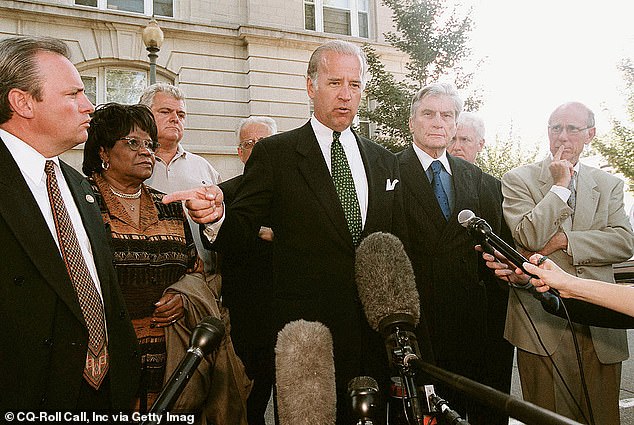
Joe Biden speaks to reporters outside Congress on September 11, 2001
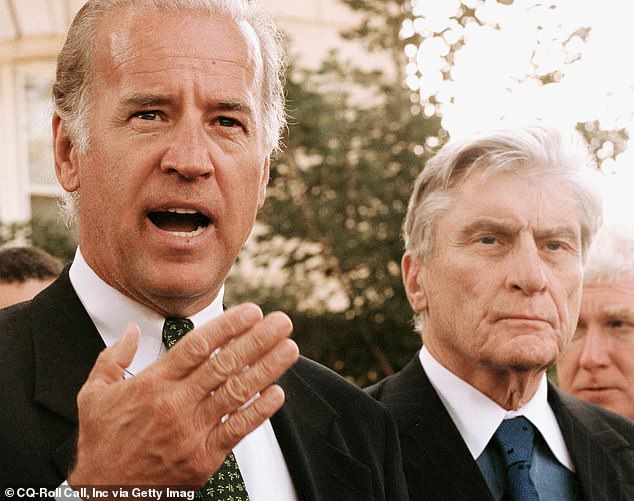
Biden, seen on September 11, 2001, was chairman of the Senate Foreign Relations Committee at the time of the attacks
Biden spoke to troops in Anchorage, Alaska, on his way home from the G20 summit in Vietnam, telling them about his memories from 22 years ago, with typical Biden exaggeration.
“I remember the plume of fire that shot into the sky at the Pentagon as I got off the Amtrak train on my way to work in the United States Senate,” he said.
Still, he wrote in his autobiography that the scene was considerably less dramatic: “I could see a cloud of brown smoke hanging in the otherwise crystal clear sky behind the Capitol dome.”
Biden, then chairman of the Senate Foreign Relations Committee, was photographed speaking to reporters outside the Capitol on September 11.
In his 2007 book Promises to Keep, Biden writes that he was in Washington DC the day after the attack: “The next morning I went back to the Capitol,” he writes.
A Gannett News Wire report from September 12, 2001, quoted by The New York Post, supported the version in his biography, beginning: “Delaware Senator Joe Biden spent Wednesday exactly where he wanted: in the U.S. Senate.”
Monday also told a dramatically different story about the next day.
“Ground Zero in New York – I remember standing there the next day and looking at the building,” he said.
‘And I felt like I was looking through the gates of hell.
“It looked so devastating because of the way you could stand, where you could stand.”
Biden describes in his book that he spoke to students at the University of Delaware on September 19, 2001.
Biden visited Ground Zero nine days after the attacks, on September 20, 2001, and was photographed touring the site with fellow senators Ted Kennedy and Barbara Mikulski – but Biden does not mention that in his book.
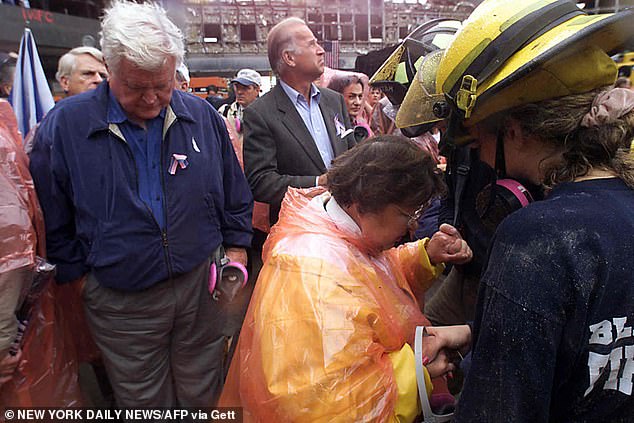
Biden (center) visits Ground Zero on September 20, 2001 with fellow senators Ted Kennedy (left) and Barbara Mikulski (center, in poncho)
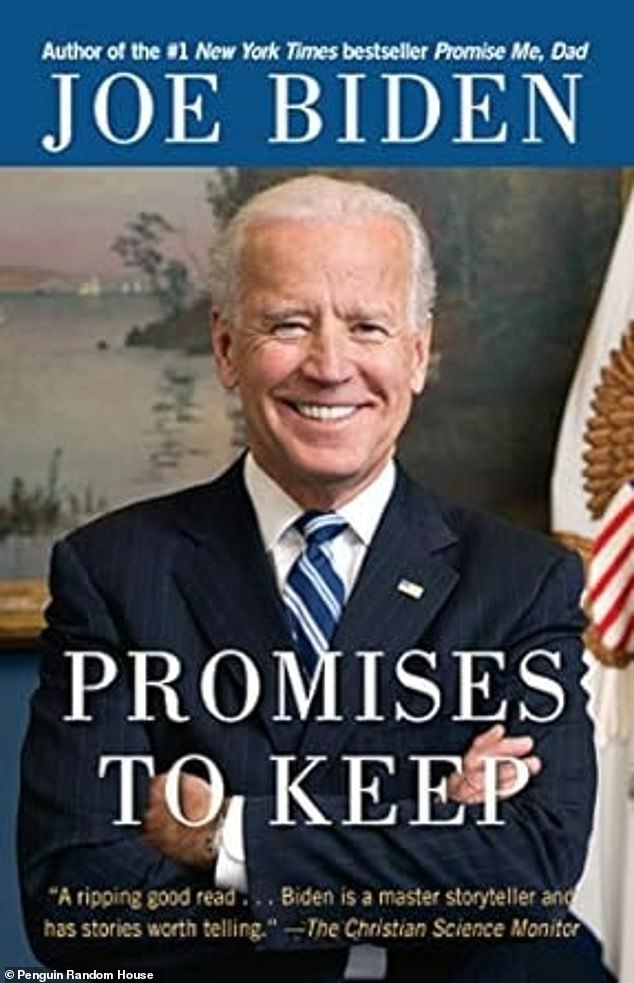
Biden’s 2007 book says he was in Washington DC on September 11 and 12, 2001
However, his book does mention a visit to a mosque in Newark, New Jersey on September 21, 2001.
Biden is known for his exaggerations and his distorted, misremembered stories.
The president, who joined the Senate Foreign Relations Committee at the age of 32 and became chairman in 2001, has spoken extensively about his “arrest” by South African police.
On February 11, 2020, Biden told an audience in South Carolina that he had been arrested in the African country.
“Thirty years ago today, Nelson Mandela walked out of prison and started discussions about apartheid,” he told the crowd.
‘I had the great honor of meeting him. “I had the great honor to be arrested on the streets of Soweto along with our UN Ambassador in an attempt to meet him on Robben Island.”
Biden did not specify the year, but was in South Africa in 1977.
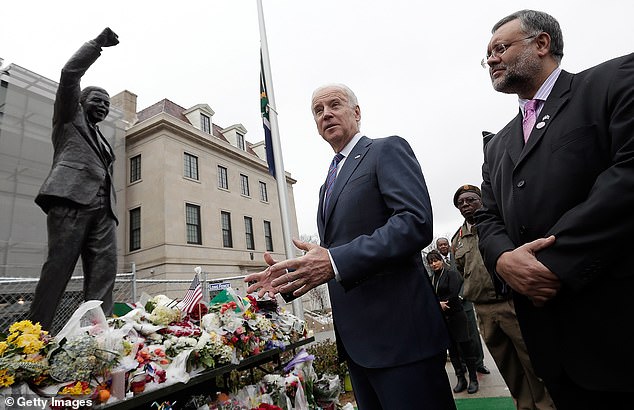
Biden is seen visiting a memorial to Nelson Mandela outside the South African embassy in December 2013. Mandela died on December 5, 2013 at the age of 95
Mandela was behind bars on Robben Island from 1964 to 1982, but Robben Island is off the coast of Cape Town, while Biden said he was in Johannesburg’s Soweto district.
Later that same month, Biden repeated the story of his arrest to a crowd in Nevada at a black history brunch.
“(Mandela) came to Washington and came to my office,” Biden said at a presidential campaign rally in Las Vegas.
“He put his arms around me and said, ‘I want to thank you.’
“I said, ‘What are you thanking me for, Mr. President?’
“He said, ‘You tried to see me.’ You were arrested trying to see me. ”
And at a second event in Las Vegas days later, Biden repeated the arrest story for a third time.
He told the crowd that he was “coming back from South Africa where he tried to see Nelson Mandela and was arrested for trying to see him.”
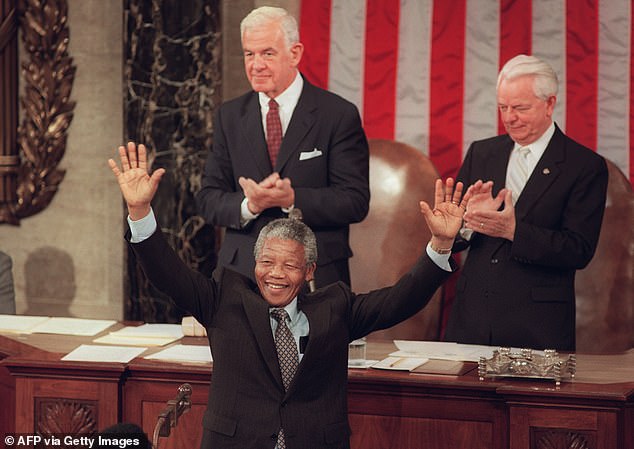
Mandela is seen at a joint meeting of the United States Congress in June 1990
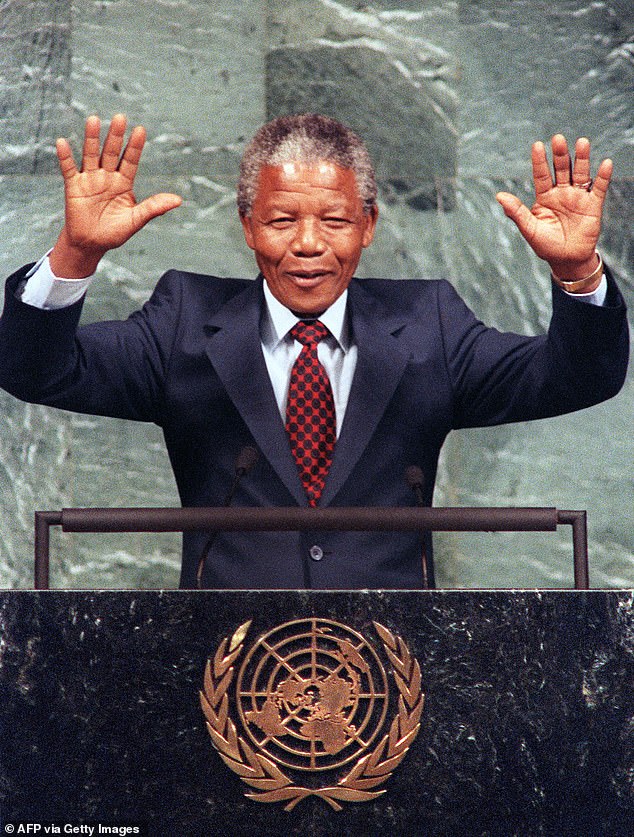
Mandela addresses the United Nations in June 1990, urging the UN to maintain sanctions on South Africa until apartheid is abolished
The claim of an arrest was debunked by The New York Times in February 2020, with multiple officials and former Senate colleagues telling the newspaper they did not remember the arrest.
The newspaper even noted that Biden’s own accounts, in his autobiography and in his statements about Mandela, made no reference to an arrest.
Fact-checkers, who dubbed Biden’s story “four Pinocchios” and called it “Pants on Fire,” found that he was separated from black colleagues when he landed at the airport in neighboring Lesotho in December 1976.
Biden was one of thirteen members of Congress who traveled to Lesotho at the time.
“As I exited the plane, I was directed to one side of the tarmac, while the African-American members of Congress traveling with me were directed to the other side,” he said.
“I refused to stop and the officials finally gave in.”
In late February 2020, amid intense interest in whether he had actually been arrested, Biden told CNN that he had not.
“When I said arrested, I meant I couldn’t move,” Biden said after recounting what happened to him.
‘The police wouldn’t let me go with them. I wasn’t arrested, I was stopped. I couldn’t move where I wanted to go.”
He did not specify whether that meeting took place in Lesotho or South Africa.
Biden has a long history of exaggerating his own biography.
He claimed in January of this year, while speaking to students at historically black colleges in Atlanta, that he had been arrested during civil rights protests — a claim for which there is no evidence.
In September 2021, he told Jewish leaders that he remembered “spending time at” and “going to” the Tree of Life synagogue in Pittsburgh after the 2018 massacre of 11 people there: it later emerged he was never there been.
The White House said he was referring to a phone call and was mistaken.
